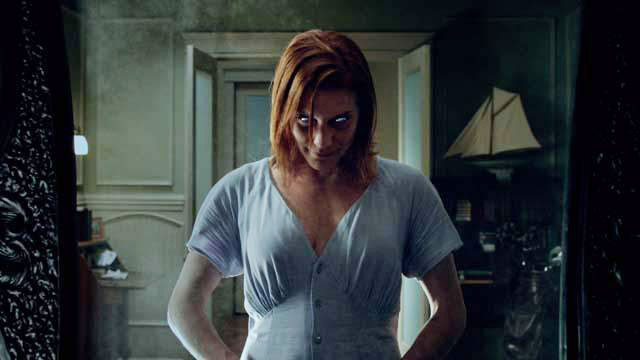Oculus (2013)
Rated R

Relativity Media
It’s been a good while since a horror film’s caught me in its spell using strong storytelling, empathetic characters and intelligent construction.
 The past 10 or so years have seen the horror genre littered with moderately successful (mostly PG-13) fare—The Exorcism of Emily Rose, Insidious 1 and 2, The Conjuring, Sinister—that has given hope to a perpetually gasping genre. These films have filled in gaps between often uninspired, sometimes insipid found-footage subgenre works (the Paranormal Activity sequels, V/H/S), so-called torture porn (the Saw sequels, Hostel, High Tension, the Evil Dead remake), undead features (Zombieland, World War Z, Shaun of the Dead, Stake Land), teen scream films (the Final Destination sequels, the Prom Night and Carrie remakes).
The past 10 or so years have seen the horror genre littered with moderately successful (mostly PG-13) fare—The Exorcism of Emily Rose, Insidious 1 and 2, The Conjuring, Sinister—that has given hope to a perpetually gasping genre. These films have filled in gaps between often uninspired, sometimes insipid found-footage subgenre works (the Paranormal Activity sequels, V/H/S), so-called torture porn (the Saw sequels, Hostel, High Tension, the Evil Dead remake), undead features (Zombieland, World War Z, Shaun of the Dead, Stake Land), teen scream films (the Final Destination sequels, the Prom Night and Carrie remakes).
Sure, along the way there have been a few that have aspired to press beyond the status quo—The Descent, The Cabin in the Woods, You’re Next, Plus One, Let the Right One In, The Purge—but frankly these days I’m finding more satisfaction with dramas and thrillers (Headhunters, The Square, the True Detective cable series, Good Neighbors) that have used horror elements for accent than with horror films themselves. Personally, I think those PG-13 successes have as much to do with abysmal alternatives as they do with being genuinely impactful genre efforts.
Oculus arrives at a time when I’ve grown tired of observing my favorite genre on life support. You’ve been waiting for a horror film that engages you as a viewer, right? Here you go. This is a full-blooded horror film that gets the job done right.
The short of it: This film is about a haunted mirror. But really, any piece of household furniture in the service of this script and this director (Mike Flanagan, Absentia) might get the job done.
After years of being separated by tragedy, two siblings reunite to take on the evil forces they believe responsible for the death of their parents. Specifically, Kaylie (Karen Gillan, Guardians of the Galaxy) believes the Damask-like antique mirror brought into their home 11 years ago eventually drove their father to murder their mother and eventually take his own life. Lack of evidence of these supernatural forces led to brother Tim (Brenton Thwaites) taking the blame and spending years in a mental institute. Kaylie has grown into a beautiful and successful antiques dealer who reacquires the mirror with a hidden agenda to seek revenge and clear the family name. Tim, meanwhile, has come to believe most of the details of the tragedy have been reworked by his mind as a coping mechanism and has simply come to accept the sad facts of his deeds.
The past and present stories function on parallel tracks, which work seamlessly even as the two time periods draw ever nearer until the finale, where they actually overlap.
OK, enough of the plot. I’ll leave you to discover its many terrors and surprises. Sound, lighting, editing and acting are all on point, but Oculus uses sure-footed manipulation of perception as its trump card. Because the mirror can manipulate time, space and sound, the film uses this device to manipulate the audience as much as the siblings.
An excellent scene, for example, involves the protagonists not sure which version of themselves is real and which is their mirror illusion. One pair is inside their home facing imminent danger, while the other pair has escaped the house. Should they act to save their endangered selves inside the house, or is it a trick of the mirror to get their outside selves back inside the house? Flanagan has a lot of fun goosing the viewer with such scenes.
Kaylie, thinking she’s fully aware of the mirror’s capabilities, has rigged the house with recording devices, alarms, and has outside contingency plans and even a failsafe. But really once we—and she—discover that the forces behind the mirror can affect and distort video/audio feeds and cell phones, how sure are we of any thing we see or hear?
This is how you build terror: you plot it, you create characters (in two time streams) that we care about, you give us the ground rules and then reveal that those rules can be bent, you use the tried and true tropes of the genre not simply to shock but to enhance story and characters.
Kaylie’s manifest love for her brother when they were kids is contrasted with her present-day disappointment in his willful attempts to deny a devastating past. Meanwhile, her obsession that has only grown since Tim was taken from her threatens to overtake her careful, rational plans. Tim tries to temper his hard-won sanity with his love for his sister; to reach her on some level involves embracing her self-assured belief in the mirror’s evil—that belief once sent him to the psych ward for years.
This film keeps getting compared to The Conjuring. This film is better than The Conjuring.

| Marvin Brown’s Movie Review Archive
Social tagging: blog > bloghouse > film > horror > Marvin Brown > Mike Flanagan > mirror > Oculus




